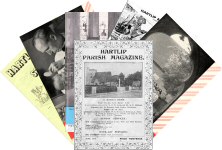
Hartlip Parish Magazine - on-line archive
October 1965 : page 7 (of 8)
Women's Institute
Mrs. Trickle presided over the September meeting, and gave the result of the afternoon tea held in Mrs. C. Steven's garden in July - £9 10s.! a very good effort and a good boost to funds.
At very short notice, Mrs. Bennett came to talk on "Ideas for Sales of Work" in place of Mrs. Turner, and this was most interesting and informative, so much so, that tentative arrangements are being made for Mrs. Bennett to come and give members a course of instruction to make some of the lovely ingenious and inexpensive things she showed us. This will probably be on Tuesdays for 10 lessons. Mrs. Turner gave a vote of thanks.
Mrs. Partridge and Mrs. Stevens won the quiz which Mrs. Lawrence (who was hostess) arranged for the social half-hour, and Mrs. Kelvie won the prize for the best apple dish - hers being "Apple Transparency".
There will be a plant stall at the next meeting, which is on October 12th, at 2.30 p.m.
The time is drawing near for the election of a new committee, and members are asked to give a thought to this, so to be ready to vote at the November meeting.
E.M.R.
A LOCAL HISTORIAN LOOKS AT HARTLIP - No. 4
Edward Hasted writing in his History of Kent of 1783 describes Hartlip as lying next to Rainham and is "not so unhealthy a situation as that place, it being further from the marshes the noxious vapours of which are intercepted by the intervening hills ... The London road runs along the northern side of it where the soil is very gravelly whence the ground rises to the village which is situated as well as the church on the west side of it on high ground. The village is surrounded by frequent orchards of apple and cherry trees which render the view of it from the London Road very pleasing though several of these plantations being worn out and decayed have been grubbed up".
Hasted refers to the rows of tall spiring elms with which the village is filled and how, above the village, the soil becomes chalky extending over poor barren country very hilly, having a great quantity of coppice woods.
In the north-east of the parish about half a mile from the London Road there is a good old mansion situated in the midst of fruit grounds called Paradise, having a large farm belonging to it. In Queen Elizabeth's time it was the property of Rowland Searle; afterwards it came into the possession of the Pitt family. Lately, said Hasted, the widow of Admiral Temple West possessed it.
It would be interesting to know where the name of Paradise was obtained?
R.A.B.